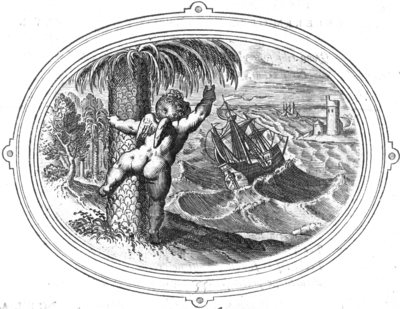Otto Vaenius, Amorum emblemata (1608)
Table of contents ↑Finis coronat opus [55]

Translations
 |
Eind goed, al goed. |
 |
All's well that ends well. |
Sources and parallels
- Finis coronat opus [34]
 (in: Otto Vaenius, Emblemata aliquot selectiora amatoria (1618)
(in: Otto Vaenius, Emblemata aliquot selectiora amatoria (1618) )
[Compare
)
[Compare ]
]
- Praz suggests as a possible source: Alciato, Book of Emblems
 , embl. 93
, embl. 93 -
Ship leaving for a safe haven, in: Aan d'overkant, is 't zalig land [10]
 (in: Pieter Huygen, Beginselen van Gods Koninkrijk (1689)
(in: Pieter Huygen, Beginselen van Gods Koninkrijk (1689) )
[Compare
)
[Compare ]
]
-
Ship leaving for a safe haven, in: Ontbind, en spoed, u van de Wal, Zo wind, en vloed, u baten zal [16]
 (in: Pieter Huygen, Beginselen van Gods Koninkrijk (1689)
(in: Pieter Huygen, Beginselen van Gods Koninkrijk (1689) )
[Compare
)
[Compare ]
]
-
Parallel for the pictura (mirrored) and the Latin and Italian motto in: Un Navire agité par les flots & jetté au Port
 (in: Daniel de la Feuille, Devises et emblemes (1691)
(in: Daniel de la Feuille, Devises et emblemes (1691) )
[Compare
)
[Compare ]
]
-
Ship on stormy sea in: In tenebris lucem. [11]
 (in: Daniël Heinsius, Ambacht van Cupido, from: Nederduytsche poemata (1616)
(in: Daniël Heinsius, Ambacht van Cupido, from: Nederduytsche poemata (1616) )
[Compare
)
[Compare ]
]
References, across this site, to this page:
- Un Navire agité par les flots & jetté au Port
 (in: Daniel de la Feuille, Devises et emblemes (1691)
(in: Daniel de la Feuille, Devises et emblemes (1691) )
)
- In tenebris lucem. [11]
 (in: Daniël Heinsius, Ambacht van Cupido, from: Nederduytsche poemata (1616)
(in: Daniël Heinsius, Ambacht van Cupido, from: Nederduytsche poemata (1616) )
)
- Aan d'overkant, is 't zalig land [10]
 (in: Pieter Huygen, Beginselen van Gods Koninkrijk (1689)
(in: Pieter Huygen, Beginselen van Gods Koninkrijk (1689) )
)
- Ontbind, en spoed, u van de Wal, Zo wind, en vloed, u baten zal [16]
 (in: Pieter Huygen, Beginselen van Gods Koninkrijk (1689)
(in: Pieter Huygen, Beginselen van Gods Koninkrijk (1689) )
)
- Finis coronat opus [34]
 (in: Otto Vaenius, Emblemata aliquot selectiora amatoria (1618)
(in: Otto Vaenius, Emblemata aliquot selectiora amatoria (1618) )
)

